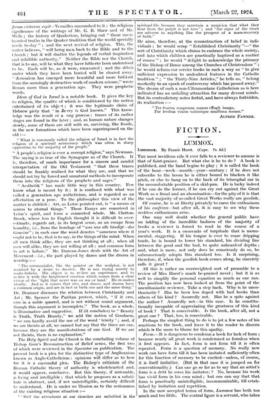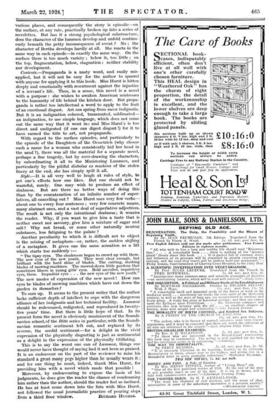FICTION.
LUMMOX.
Lummox. By Fannie Hurst. (Cape. 7s. 6d.) THE most invidious role it ever falls to a reviewer to assume is that of faint-praiser. But what else is he to do ? A book is published, and the band begins to play ; it is called the book of the hour—week—month—year—century ; if he does not subscribe to the boom he is either bound to blacken it like pitch, or else to hang on to the back of its triumphal car in the uncomfortable position of a skid-pan. He is lucky indeed if he can do the former, if he can cry out against the Great Work as a fraud and an abomination—for the pityof it is that the vast majority of so-called Great Works really are goodish.
Of course, he is at liberty privately to curse the enthusiasm of his confreres—but after all, it is easy to see why these reckless enthusiasms arise.
One may well doubt whether the general public have an inkling of the incredible badness of the majority of books a reviewer is forced to read in the course of a year's work. It is a crescendo of turpitude that is monu- mental, staggering. If his tongue is ever to cease dripping toads, he is bound to lower his standard, his dividing line between the good and the bad, to quite unheard-of depths ; and, what is more, not only does he consciously do so, he subconsciously adopts this standard too. Is it surprising, therefore, if, when the goodish book.comes along, he sincerely calls it great ?
All this is rather an overweighted sort of preamble to a review of Miss Hurst's much be-praised novel ; but it is as well to simplify the personal equation as much as one can. The position has now been looked at from the point of the unenthusiastic reviewer. Take a step back. Why is he unen- thusiastic ? Has he been less doped with bad books than others of his kind ? Assuredly not. Has he a spite against the author ? Assuredly not—in this case. Is he constitu- tionally incapable of appreciating the greatness of this kind of book ? That is conceivable. Is the book, after all, not a great one ? That, too, is conceivable.
Perhaps the simplest thing to do is to jot a few notes of his reactions to the book, and leave it to the reader to discern which is the more to blame for this apathy.
Form.—It is dangerous to condemn a book for lack of form ; because nearly all great work is condemned as formless when it first appears. In fact, form is not form till it is often repeated. Form is a question of memory. No really new work can have form till it has been imitated sufficiently often for this function of memory to be excited—unless, of course, it is itself imitative. (But in that ease it is jumped on for conventionality.) Can one go so far as to say that an artist's form is a debt he owes his imitator:: ? No, because his work has vivid form in his own mind ; but one can say that that form is practically unintelligible, incommunicable, till estab- lished by imitation and repetition.
In the now accepted terms of form, Lummox has both too much and too little. The central figure is a servant, who takes
various places, and consequently the story is episodic—on the surface, at any rate, practically broken up into a series of novelettes. But has it a strong psychological substructure, does the character of the lummox develop and unfold continu- ously beneath the petty inconsequence of event ? No ; the character of Bertha develops hardly at all. She reacts in the same way in each episode—in exactly the same way. On the surface there is too much variety ; below it, too little ; on the top, fragmentation, below, stagnation : neither stability nor development.
Contents.—Propaganda is a nasty word, and easily mis- applied, but it will not be easy for the author to quarrel with anyone for applying it to this book. Miss Hurst is bitten deeply and emotionally with resentment against the injustice
of a servant's life. Thus, in a sense, this novel is a novel with a purpose : she wishes to awaken American mistresses to the humanity of life behind the kitchen door. But propa- ganda is rather too intellectual a word to apply to the fruit of an emotional disgust. Art can spring from sacva indig,natio.
But it is an indignation cohered, transmuted, sublimated— an indignation, to use simple language, which does not come out the same way that it went in: and Miss Hurst's is too direct and undigested (if one can digest disgust 1) for it to
have earned the title to art, not propaganda.
With regard to the surface episodes, and particularly to the episode of the Daughters of the Oessetrich (why choose such a name for a woman who consistently hid her head in the sand ?), there was all the material for a separate novel, perhaps a fine tragedy, but by over-drawing the characters,
by subordinating it all to the Ministering Lummox, and particularly by the pitiful diabolus ex mac,hina of the stolen finery at the end, she has simply spilt it all.
Style.—It is all very well to laugh at rules of style, to get one's effects how one likes. But one should not be wasteful, surely. One may wish to produce an effect of
drabness. But are there no better ways of doing this than by the concatenation of an infinite number of super-
latives, all cancelling out ? Miss Hurst uses very few verbs—
about one to every four sentences ; very few concrete nouns, many abstract ones, and a vast deal of superlative adjectives. The result is not only the intentional drabness ; it wearies the reader. Why, if you want to give him a taste that is neither sweet nor savoury, give him a mixture of sugar and salt? Why not bread, or some other naturally neutral substance, less fatiguing to the palate ?
Another peculiarity to which it is difficult not to object is the mixing of metaphors—or, rather, the sudden shifting of a metaphor. It gives one the same sensation as a lift
which starts too suddenly :-
" The tipsy eyes. The cloakroom began to crowd up with them. The new eyes of the new youth. They were clear enough, but brilliant with the hard shine of blades. The cutting, slashing blades of mowing-machines. The mowed-down little gardens that sometimes bloom in young girls' eyes. Bold unveiled, inquisitive eyes, these. Impudent eyes . . . the new eyes of the new youth."
The new modes of expression of the new novel I How can eyes be blades of mowing machines which have cut down the garden in themselves ?
To sum up. It seems to the present writer that the author lacks sufficient depth of intellect to cope with the dangerous alliance of her indignatio and her technical facility. Lummox should be redevoured, redigested, and reproduced in twenty- five years' time. But there is little hope of that. In its present form the novel is obviously reminiscent of the Scandi- navian school,of the Dille series in particular,with the Scandi- navian romantic sentiment left out, and replaced by its reverse, the sordid sentiment—for a delight in the vivid expression of the physically disgusting is just as sentimental as a delight in the expression of the physically titillating.
This is to say the worst one can of Lummox, things one
would never have thought of saying had it not been so praised. It is an endeavour on the part of the reviewer to raise his
standard a great many pegs higher than he usually wears it ; and for one thing he must, indeed, thank Miss Hurst, for providing him with a novel which made that possible I Moreover, by endeavouring to expose the basis of his
judgments, he does give the reader the chance of condemning him rather than the author, should the reader feel so inclined. He has at least come down into the lists with Miss Hurst, not followed the usual journalistic practice of pouring slops















































 Previous page
Previous page